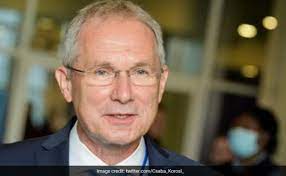NEW DELHI: The UN Security Council (UNSC) does not reflect today’s realities, is paralysed and unable to discharge its basic function of maintaining international peace and security, UN General Assembly president Csaba Korosi has said.
“More than one-third of the UN membership directly addressed this question. So, there’s very clearly a push from the membership. I do have hopes,” he said on UNSC reforms before arriving here on Sunday on a three-day visit, his first to any country since he took over the UNGA presidency in September 2022 from Maldives’ Abdulla Shahid.
The issue of UNSC reforms is both “burning” and “compelling” since the composition of the UNSC reflects “the outcome of the Second World War”. “Since then, the world has changed. The geopolitical relations in the world altered. The economic responsibilities in some countries, including India and some very strongly developing nations, actually changed,” he said.
During the visit, Korosi will hold talks with External Affairs Minister S Jaishankar on key multilateral and regional issues, said an MEA release. “So, the composition of the UNSC does not reflect today’s realities,” he said while pointing out that a whole continent like Africa with 50-plus countries did not have a single permanent UNSC member.
Korosi’s visit to India is being seen as an opportunity to exchange views on global challenges that the UN is currently seized with. A diplomat from Hungary, which is an active NATO member, he appeared to blame Russia for the current impasse. “The UNSC cannot discharge its basic function for a very simple reason. One of the permanent members attacked its neighbour. But because of the veto power, the Security Council cannot act,” he said.
In India, Korosi will interact with NITI Aayog officials and members of India’s G20 presidency team. He will also deliver a public address on his presidency theme of “Solutions through Solidarity, Sustainability and Science in the UN”. He will be in Bengaluru on January 31 to interact with scientists at the Indian Institute of Science (IISc) and also visit some development projects.
Korosi has appointed Slovak Republic’s Michal Mlynar and Kuwait’s Tareq MAM Albanai as co-chairs of the Intergovernmental Negotiations on UNSC reform. Last week, the G4 had complained that it had been meeting for 15 years with “nothing concrete to show for our efforts… not even a zero-draft consolidating the attributed positions of interested stakeholders.”


